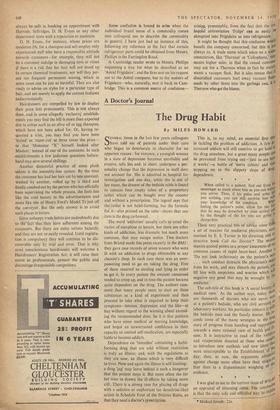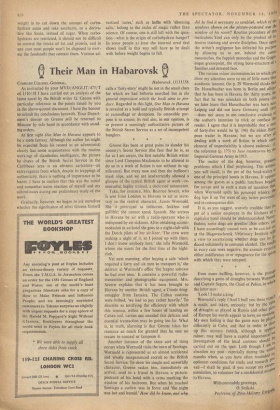A Doctor's Journal
The Drug Habit
By MILES HOWARD The word 'addiction' usually calls to mind the victim of morphine or heroin, but there are other kinds of addiction, less dramatic but much more common, that may escape notice. Two doctors from Bristol made this point recently in the BNB: they gave case records of seven women who were ill with an addiction to drugs obtainable at any chemist's shop. In each case there was an over- powering need to go on taking the drug. Five of them resorted to stealing and lying in order to get it. In every patient the amount consumed tended to creep up, and in time the patient became quite dependent on the drug. The authors com- ment that many people seem to start on these substances as a kind of experiment and then proceed to take what is required to keep their symptoms—tension, depression and the like—at bay without regard to the warning about exceed- ing the recommended dose. So it is that patients who have some medical or nursing knowledge, and hegce an unwarranted confidence in their capacity to control self-medication, are especially liable to become addicts.
Dependence on 'remedies' containing a habit- forming drug that are sold without restriction is truly an illness; and, with the regulations as they are now, an illness which is very difficult to treat. Now and again the illness is self-limiting : a drug 'jag' may leave behind it such a hangover that the patient stops it. But more often she (or he) tries to drown the ill-effects by taking more still. There is a strong case for placing all drugs with a sedative or euphoriant (or dexedrine-like) action in Schedule Four of the Poisons Rules, so that they need a doctor's prescription. This is, to my mind, an essential first steP in tackling the problem of addiction. A few dc: termined addicts will still contrive to get hold 01 the drug somehow, but a great many people can be prevented from trying out—'just to see 1101 it works'—a bottle of 'nerve tablets' and thus stepping on to the slippery slope of drub" dependence.
* * When called to a patient, find out from his messenger as much about him as you can before you arrive. Then, if his pulse• and urine tell you nothing, you can still surprise him with your knowledge of his Condition. . . . feeling the patient's pulse, allow for the 1.3'A' that he may be disturbed by your arrival an by the thought of the fee you are going to charge him. These very practical bits of advice come fr°11/ a set of maxims for medieval physicians, sum' marised by E. S. Turner in his diverting and In structive book Call the Doctor.* The seal' maxim quoted points to a proper' awareness of lbo common causes of rapid heart-beat. Another 's 'Do not look lecherously on the patient's wire . . . such conduct distracts the physician's mind j from his work, and may disturb the patient. 011 fill him with suspicions and worries which o'''e negative any good that may be wrought by th medicine.' The sub-title of this book is 'A social historY t/f medical men.' As the author says, today Illere are thousands of doctors who are never seen at a patient's bedside, who are civil servants or laboratory workers; his particular concern is v'lth the bedside man and the family doctor. 1-ie re, , cords some of the many wrangles in the story of progress from humbug and superstit'71 towards a more rational view of health and / ness. It is instructive to read of the violerlht cc and vituperation directed at those who s°'1,,g„t to introduce new methods and new ideas 1"" the were unacceptable to the Establishment o in day; then, as now, the arguments advancin against change more often have their ore fear than in a dispassionate weighing of the evidence.
* * ?
I was glad to see in the current issue of I Or an appraisal of slimming cures. The conchisP; is that the only safe and effective way to reduc • Michael Joseph : 21s. weight is to cut down the amount of carbo- hydrate eaten and take saccharin, or a deriva- tive like Saxin, instead of sugar. When carbo- hydrates are restricted, it should not be difficult to control the intake of fat and protein, and in any case most people won't be disposed to over- eat the foodstuffs that contain them. Various ad- d- THE vertised 'cures,' such as baths with 'slimming salts,' belong to the realm of magic rather than science. Of course, one is still left with the ques- tion—what is the origin of carbohydrate hunger? In some people at least the internal need that shows itself in this way will have to be dealt with before weight begins to fall.







































 Previous page
Previous page